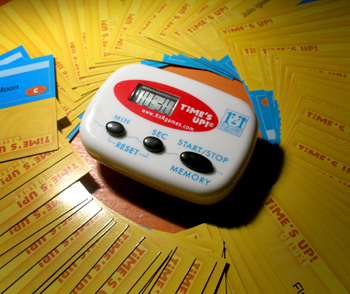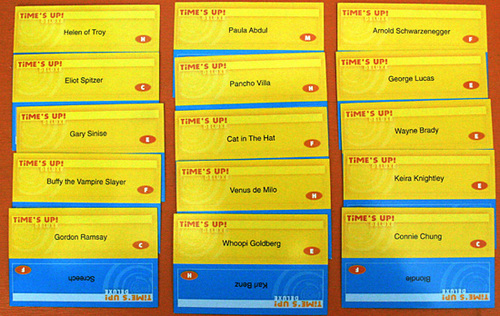Time's Up: Like a party game except more fun

Mike Hulsebus | Contributor
I don't know if you've read the back of party game boxes recently, but with word “hilarious” comes up a lot. And if that claim weren't lofty enough, others promise to be “outrageous” enough that they will cause you to “hoot and high-five.” I understand that it's ad copy, which sometimes causes “mildly amusing” to become “wild and crazy” in edits, but I would appreciate if someone would be at least a little honest. So let's skip over the cheesy marketing and check out if Time's Up is worth your time.
In Time's Up, players divide into multiple teams of two (though there are well thought out rules for 5 or 7 players if you don't have even numbers) and make up a deck of 40 cards of famous people from the pool of 525 cards provided. More on how the deck is made later, but the important thing that you need to understand is that the same 40 cards will be used throughout the whole game. Players pass the deck around from one team to the next, each attempting to get their partner to guess as many of the cards as possible in 30 seconds.
The game is divided into three rounds. Round 1 is pretty simple: you can say just about anything to get your partner to guess the person. After the deck is depleted, the teams tally their scores and then shuffle all the cards back together to be used again for the next rounds.
Rounds 2 and 3 are what make the game. In Round 2, using the same cards, players can say only one word per card. So where in Round 1, you may have said “A former president that had his own policy of economics named after him” to get someone to guess Ronald Reagan, in Round 2, you might just say “economics” and hope that your partner remembered that Reagan was in the deck. Players are also allowed to act and make noises in this round. Then, in Round 3, players aren't allowed to say any words at all. So for Round 3, maybe you'll try to act out jowls, assumed he's the only bejowled person in the deck.

Famous people used in the game range from video game characters to historical figures to movie stars.
Mike Hulsebus | Contributor
The game is really fun and despite how it may sound, you don't need to know celebrities or historical figures to do well. One of the smart things that the publishers did was allowing each player to see a small part of the deck before the game and allowing them to throw out two cards that he or she doesn't know or doesn't think that other people would know. And even though there still will be unknown people in the deck (sorry Brian De Palma, I had no idea who you were), the unknown people even help make the game interesting. Between rounds, players can consult the rule book's glossary to see who everyone is.
The different rounds give the game a nice variety: Every round has its own feel and keeps things from feeling too similar.
The main problem with the game (and with any party game of this type), I would say, is that, even with the varied rounds, some people are likely to be better at the game than others. I think you don't need to win to have fun, but still, certain people are going to be better at certain parts and you may want to break teams up to mitigate the advantage that couples might have.
Take, for example, me and my wife Karen (who, by the way, loves this game). We were playing a game in which Karen described to me, “I'm not sure who this is,” she said, “but I think this is Don Quixote's sidekick”. She was mistakenly describing Sancho Panza even though her card read Pancho Villa, Mexican revolutionary general. Still, I mentally made the same mistake and guessed Pancho Villa and we got the point even though we didn't realize until later how wrong we were. This also happened with Jonathan Swift and Tom Swift.
Yes, there are a lot of people who are near impossible to act out (I'm looking at you, Margaret Thatcher), but the challenge of that makes the game fun instead of frustrating. You'll be completely confused why your friend is miming his head exploding on the floor, but then later realize he was acting out a whale's blowhole for Herman Melville and laugh.
Every board gamer should have a few games in his collection that are accessible, accommodate a large number of people, and are easy to teach (unless your friends' idea of a party game is Battlestar Galactica, in which case, why didn't you send me an invitation?). If you're looking for a more low-key game, I recommend my favorite party game, Wits and Wagers, but if you've got some people who are willing to play a game that's a little silly, Time's Up is the best party game I've played in quite a while. I don't know if I would call it “wild and crazy,” but it sure was a good time.
Mike Hulsebus is convinced that "but watch out!" is the most common phrase on the back of board game boxes in the same way that "irreverent" is overused in reviews of comedy movies. He can be reached at mikehulsebus@gmail.com


Comments
Mike Hulsebus
Tue, Jun 22, 2010 : 7:44 a.m.
No, Roz, I haven't played Agricola, but I've read the rules. It, like Puerto Rico, is a game that I'm excited to someday try but that I'm not sure I'll ever end up buying because I'm not sure who I'd get to regularly play it with even if it did become my favorite game; I feel like there are other games people I play with would rather play than economic games. BUT, I say that having played neither. I'm curious how easy-to-pick-up the family game rules of it are. I have a friend with Puetro Rico and I'll get to try that hopefully someday soon.
roz
Tue, Jun 22, 2010 : 6:45 a.m.
So glad you're writing this column. Have you tried my top favorite game "Agricola"? Even better than Dominion.
Jeffrey Parker
Mon, Jun 21, 2010 : 10:08 a.m.
I agree this is a great game, but there's no need to pay for this version of it. The game concept has been around awhile and you can find the instructions on wikipedia http://en.wikipedia.org/wiki/Celebrity_%28game%29. You have to come up with your own famous people and write them down, but I think that's half of the fun.